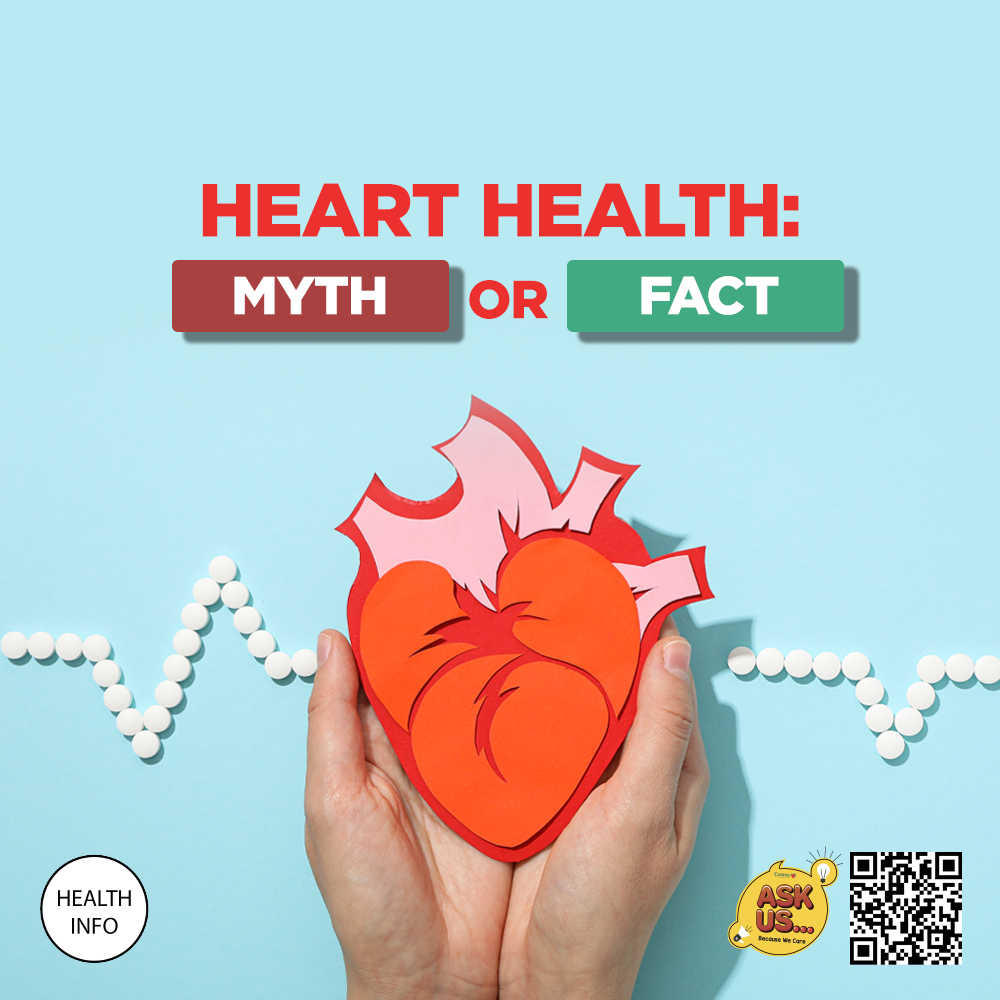
Despite numerous efforts from healthcare institutions and the government, raising public awareness about heart health remains challenging. With the rise of social media and the internet, many misconceptions and myths about heart disease continue to spread among the public. Let’s clear up some common myths so we can learn how to keep our hearts healthy.
Myth 1: “Heart disease only affects older adults; younger people don’t have to be concerned about it.”
Fact:
- Many people think heart disease only affects older adults, but it can happen to anyone, regardless of age.
- Bad habits like poor diet, lack of exercise, smoking, and excessive alcohol consumption can lead to heart issues even in young adults.
- According to the American Heart Association (AHA), conditions like high blood pressure and obesity in younger populations increase their risk of developing heart disease later in life.1
- Therefore, people of all ages need to adopt heart-healthy habits.
Myth 2: “Heart disease runs in my family, so there’s nothing I can do to prevent it.”
Fact:
- While a family history of heart disease can increase your risk, it does not mean that you are destined to develop it.
- Genetics plays a role, but lifestyle choices are equally important.
- By actively managing risk factors such as maintaining a healthy and balanced diet, engaging in regular exercise, avoiding tobacco use, ensuring enough sleep, and attending regular health screenings, you can significantly decrease your risk of developing heart disease.
- The Centers for Disease Control and Prevention (CDC) emphasize that lifestyle changes can prevent or delay heart disease, even for those with a family history.2
Myth 3: “I’ll experience symptoms if I have high blood pressure.”
Fact:
- High blood pressure, or hypertension, is often called the “silent killer” because it typically shows no symptoms.
- Many people are unaware that they have high blood pressure until they experience severe complications like heart attack or stroke.
- Therefore, regular screenings are essential to detect and manage hypertension.
- The American Heart Association (AHA) advises adults to check their blood pressure at least once every two years, and more frequently if they have risk factors.3
Myth 4: “All cholesterol is bad.”
Fact:
- Cholesterol is commonly perceived negatively, but it serves essential roles in cell structure and hormone production.
- It is crucial to differentiate between “good” HDL cholesterol, which helps remove “bad” LDL cholesterol from the bloodstream, and LDL cholesterol, which can lead to artery plaque buildup and heart disease risk. 4
- The National Heart, Lung, and Blood Institute advises managing cholesterol levels through diet, exercise, and medication for overall heart health.4
Conclusion:
In today’s digital age, medical information is readily accessible thanks to technology, but it also spreads myths about heart health. Individuals must discern fact from fiction, particularly in matters concerning the heart. Let’s put these misconceptions to rest and strive for better heart health hand in hand!
References:
- American Heart Association. (2019). How to help prevent heart disease at any age. Retrieved from https://www.heart.org/en/healthy-living/healthy-lifestyle/how-to-help-prevent-heart-disease-at-any-age.
- Centers for Disease Control and Prevention. (2024). Heart disease facts. Retrieved from https://www.cdc.gov/heart-disease/data-research/facts-stats/?CDC_AAref_Val=https://www.cdc.gov/heartdisease/facts.htm
- American Heart Association. (2017). Understanding blood pressure readings. Retrieved from https://www.heart.org/en/health-topics/high-blood-pressure/understanding-blood-pressure-readings
- National Heart, Lung, and Blood Institute. (2020). High blood cholesterol. Retrieved from https://www.nhlbi.nih.gov/health-topics/high-blood-cholesterol
Latest Health Info
Healthy Weight, Happy Joints
How Does Weight Affect Knee Health? The Link Between Pounds And Pain Osteoarthritis (OA) involves the degeneration of joints, which ...
The Gut Warriors: Prebiotics, Probiotics and Postbiotics
When it comes to gut health, you’ve probably heard of prebiotics and probiotics. But did you know there’s also ...
Tip Moreh: Masa Berbuka Puasa
Moreh adalah tradisi unik yang biasanya diadakan selepas solat tarawih pada bulan Ramadan. Ia melibatkan penyediaan dan perkongsian makanan ringan ...




